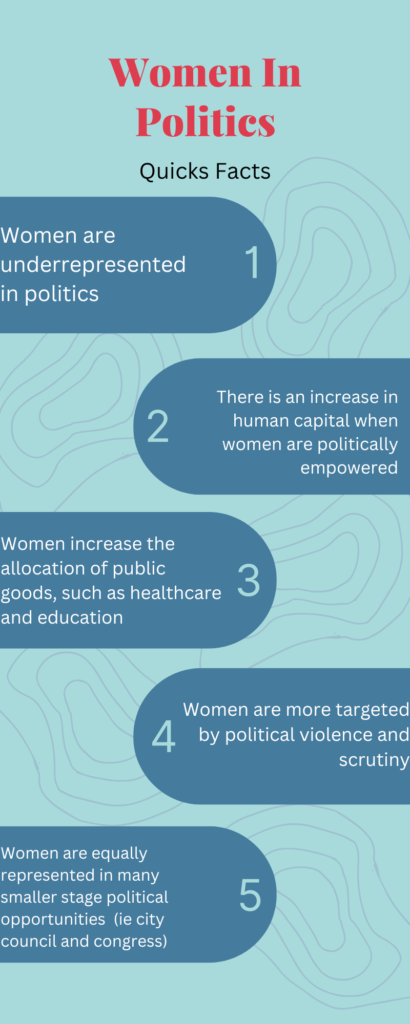By: Cole Berglund, Owen Mcdermott, Roshan Syed
Summary:
Gender equality causes difficulties for women in the political world. Not only are women vastly outnumbered in politics, but they receive harassment from voters as well as their peers.[1] Being a minority in politics, women are put under a microscope for their political actions. In some cases, women are extensively recognized for their success but also blamed severely for failures.[2] Men are more encouraged by the public to run for office than women. Women exemplify that they can succeed in political positions, as they are equally represented in positions such as city council and congress.[3] Despite frequent success in local political positions, women are rarely considered for state and federal roles[4]. The gender gap in political support is most notable for elected offices. Margaret Conway discusses the drawbacks women face in the political world, particularly entry into elected offices. Theories that suppress women from elected offices include the confining social norms of domestic life for women, the acquired skills gathered from non-political activities that are geared towards men, and gatekeeping who can acquire sufficient endorsements, finances, and staff to successfully run for office.[5]
Policy
While there are many challenges in specifically combating the generational discrimination against women in politics, implementing required courses that inform children at a young age about politics and the steps necessary to make a career in government could help level out the numbers. More importantly, societal acceptance of women in government is the most crucial point, after all, these are elected positions, and without change, the current discrimination trends will continue. To combat gatekeeping, a policy should be enacted that requires a political party to put forth a man and a woman during the selection phase. This will solve the internal issues of gender inequality and give women equal opportunity to be voted into federal positions.
How this impacts you
These issues impact us personally because men and women are different; half of society is female, so women should account for half of these positions. It does not make sense for leadership positions to be predominantly male if society is not predominantly male.
What have you learned/Questions
Research has shown us that women are unfairly and unjustly treated in politics- female representation needs to increase if we want to strive for a more balanced and equal society.
- As women fight for equal representation, what can students like us do to help aid this process?
- What are the steps we can take to break down the negative stigma around women not just in politics but in all places of work?
Sources
[1] Mona Lisa Krook (2020). Violence Against Women in Politics (In: Sawer, M., Jenkins, F., Downing, K. (eds) How Gender Can Transform the Social Sciences. Palgrave Pivot) https://doi.org/10.1007/978-3-030-43236-2_6
[2] Lovenduski, Joni. Feminizing Politics. Polity, 2005
[3] Conway, Margaret. Women and Political Participation. PSOnline, https://www.jstor.org/stable/1350210
[4] Mona Lisa Krook (2020). Violence Against Women in Politics
[5] Conway, Margaret. Women and Political Participation. PSOnline, https://www.jstor.org/stable/1350210
